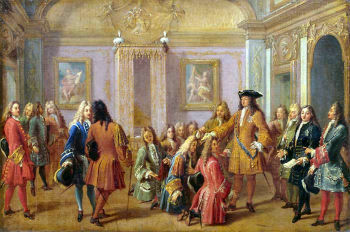Aristocracy it was a form of government practiced by people who stood out in society and was practiced in Ancient Greece.
In the Modern Era it meant a group of people who held the power of the monarch by occupying positions in the administration of the government.
Origin of Aristocracy
The word aristocracy has a Greek origin and means "aristos", improve "cracia", power. In this way, aristocracy literally means the "government of the best". It would be one more form of government that existed in the world such as democracy, plutocracy, etc.
The aristocracy would be formed by a group of people distinct from the rest of society. This distinction would be given through lineage, wealth and inheritance. That's why they receive the name "Aristos", the best individuals of a society or, in the Greek case, city-states.
Aristotle he was an author who studied the aristocracy and defended it as a form of government. The philosopher claimed that aristocrats thought of the common good, as opposed to Oligarchy who only defended his own interests.
What is Aristocracy?
With the rise of the Roman Empire, the aristocracy gains a fundamental importance to support the Emperor assuming positions of trust. Although they no longer constitute a form of government, it is impossible to conceive the monarchy without the aristocracy.
During the feudal period, giving titles and privileges to nobles was a way for the sovereign to compensate for the military services rendered by individuals in defense of the territory.

In the western world, during the Absolutism, the aristocracy was becoming a privileged class that gravitated around the king.
In this way we arrive at the most popular meaning that aristocracy is synonymous with an economically privileged group of people.
Rural and Brazilian Aristocracy
During the Brazil Empire, the Brazilian aristocracy was created through its two monarchs.
It is common to speak of rural aristocracy in the 19th century. This occurs because the large rural landowners received titles of nobility - usually "baron" - from the Emperor D. Pedro II.
Also soldiers who stood out in military campaigns were awarded titles of nobility as was the case of the Baron of Caxias who became the only Duke during the reign of Dom Pedro II.
Politicians who excelled in diplomatic missions such as José Maria da Silva Paranhos, who was distinguished with the title of Visconde de Rio Branco and who passed on to his son, the Baron of Rio Branco.
read more:
- Ancient Greece
- Forms of Government
- Republic
- Political Philosophy
- Plutocracy
- Democracy
- What is Policy?
